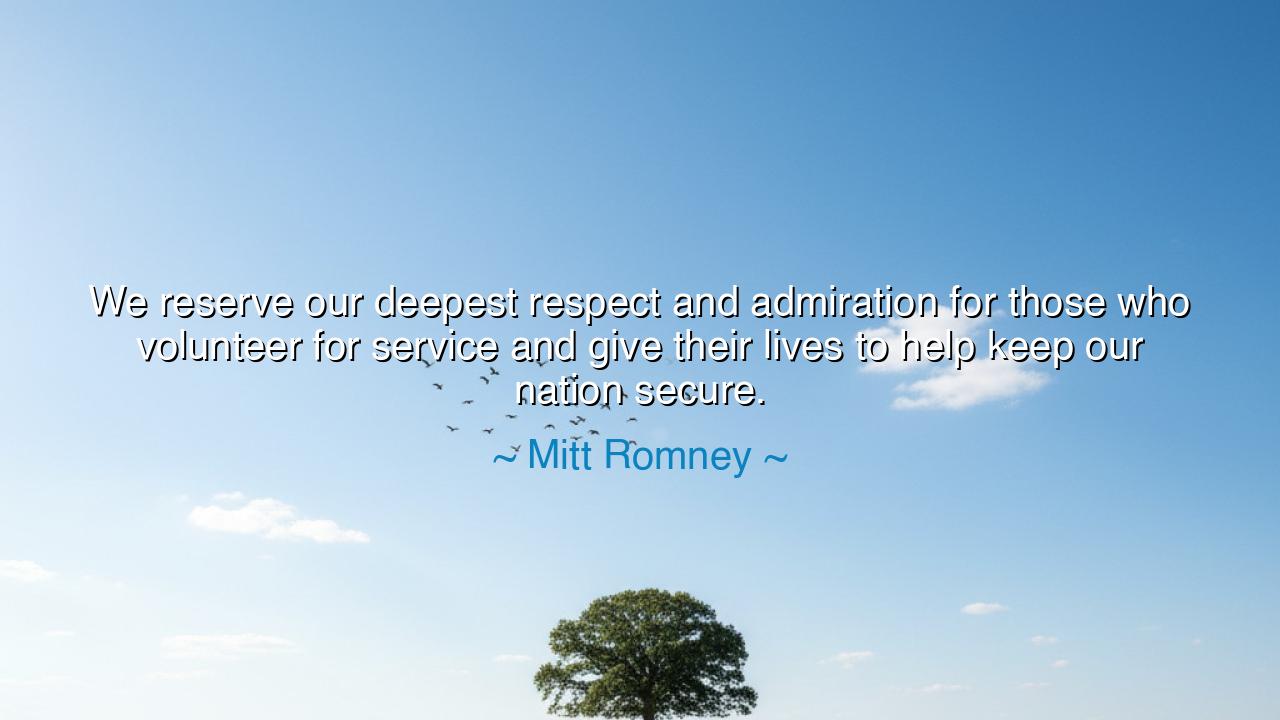
We reserve our deepest respect and admiration for those who
We reserve our deepest respect and admiration for those who volunteer for service and give their lives to help keep our nation secure.






The words of Mitt Romney—“We reserve our deepest respect and admiration for those who volunteer for service and give their lives to help keep our nation secure”—carry the solemn weight of both gratitude and reverence. They are not merely a salute to the fallen, but an invocation of an eternal truth: that sacrifice is the highest expression of love for one’s people. In this statement, Romney speaks not as a politician, but as a citizen voicing a sacred covenant between the living and the dead. His words remind us that the freedom we inherit each morning is paid for by those who gave their last evening in its defense.
The origin of this quote lies in the context of remembrance—a reflection on those who serve in the military, police, fire, and humanitarian fields, who step forward in times of peril not for wealth or fame, but for duty. Romney, known for his political career and measured tone, spoke these words to honor those who volunteer for national service, especially those who fall in the line of duty. In doing so, he touched upon a principle older than any nation—the principle that true honor is earned by those who give, not by those who take. His quote belongs to the long lineage of human gratitude, stretching from the Roman soldier who stood at the bridge to the modern marine guarding the frontier of peace.
In these words echoes the wisdom of the ancients, who understood that the safety of a society depends not upon walls of stone but upon hearts of courage. The philosopher Thucydides, writing of the warriors of Athens, declared that “the secret of happiness is freedom, and the secret of freedom is courage.” Romney’s quote mirrors this timeless creed. A free nation is not maintained by the comfortable, but by the courageous—those who rise from ordinary lives to meet extraordinary dangers. To “reserve our deepest respect” is not a mere gesture; it is a moral obligation to remember that liberty is not inherited lightly, but guarded by the vigilance and valor of others.
Consider the story of Sergeant First Class Alwyn Cashe, an American soldier who, in Iraq, rushed into a burning vehicle six times to save his comrades, his body engulfed in flames. He died of his wounds days later. Cashe’s heroism was not born of impulse but of character—the unspoken belief that his brothers’ lives were worth more than his own. For many years, his sacrifice was unsung, yet when the nation finally recognized him with the Medal of Honor, it fulfilled the very essence of Romney’s words. To reserve our deepest respect means not only to mourn the dead, but to recognize the divine within human courage—the willingness to lay down one’s life for others.
Romney’s declaration also speaks to the voluntary nature of service. In a world where self-interest often rules, the act of volunteering—to serve without compulsion, to defend without demand—stands as a miracle of conscience. Such service springs from a well that lies deep within the human spirit: the call to protect, to build, to heal. Whether it is the soldier at war, the doctor in disaster zones, or the firefighter entering smoke and flame, these individuals remind us that the noblest form of strength is sacrifice made willingly. Their lives testify that greatness is not measured in power, but in service.
And yet, the meaning of Romney’s words extends beyond the battlefield. The security of a nation is not only military—it is moral, civic, and spiritual. Every teacher who shapes a young mind, every nurse who guards the sick, every citizen who stands against injustice contributes to the defense of the nation’s soul. To honor the fallen truly, we must emulate their virtue in our own domains. Respect for sacrifice must inspire responsibility; admiration for courage must awaken action. It is not enough to speak gratitude—we must live gratitude through service, empathy, and unity.
The lesson of these words is clear and enduring: we are heirs to the courage of others, and that inheritance demands stewardship. Let us remember the fallen not as distant heroes but as mirrors of what we might become. Let us teach our children that freedom’s price is not written in gold, but in the blood and devotion of those who came before. And let us build a world that honors their memory not through war, but through peace born of respect and justice.
So, my child, when you walk through quiet streets or sleep beneath the calm sky, remember those who stood between you and chaos. Do not let comfort make you forget their courage. Speak their names, learn their stories, and carry forward their spirit. For a nation that remembers its heroes does not merely survive—it endures, its heart bound by gratitude, its people united by respect, and its future safeguarded by the living legacy of the brave.






AAdministratorAdministrator
Welcome, honored guests. Please leave a comment, we will respond soon